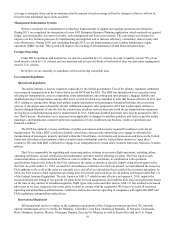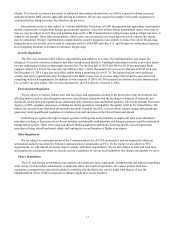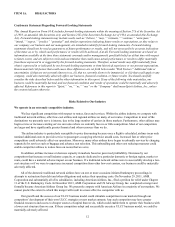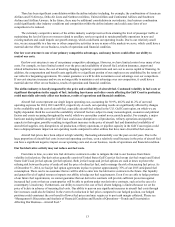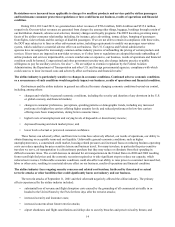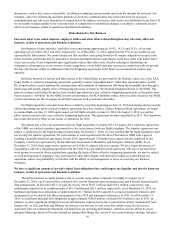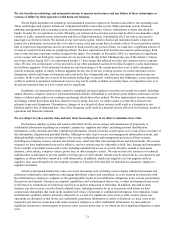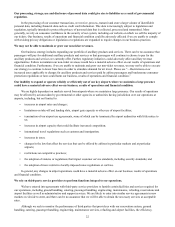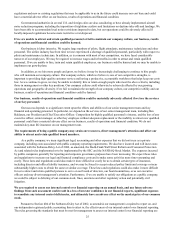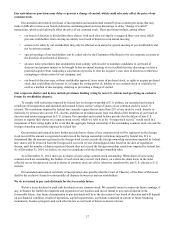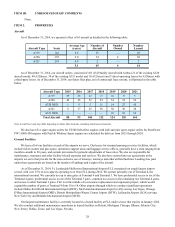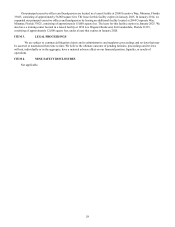Spirit Airlines 2014 Annual Report Download - page 20
Download and view the complete annual report
Please find page 20 of the 2014 Spirit Airlines annual report below. You can navigate through the pages in the report by either clicking on the pages listed below, or by using the keyword search tool below to find specific information within the annual report.20
of aircraft, installation of new safety-related items and removal and replacement of aircraft parts that have failed or may fail in
the future. A decision by the FAA to ground, or require time consuming inspections of or maintenance on, our aircraft, for any
reason, could negatively affect our business and financial results. Federal law requires that air carriers operating large aircraft
be continuously “fit, willing and able” to provide the services for which they are licensed. Our “fitness” is monitored by the
DOT, which considers factors such as unfair or deceptive competition, advertising, baggage liability and disabled passenger
transportation. While the DOT has seldom revoked a carrier's certification for lack of fitness, such an occurrence would render
it impossible for us to continue operating as an airline. The DOT may also institute investigations or administrative proceedings
against airlines for violations of regulations.
International routes are regulated by treaties and related agreements between the United States and foreign
governments. Our ability to operate international routes is subject to change because the applicable arrangements between the
United States and foreign governments may be amended from time to time. Our access to new international markets may be
limited by our ability to obtain the necessary certificates to fly the international routes. In addition, our operations in foreign
countries are subject to regulation by foreign governments and our business may be affected by changes in law and future
actions taken by such governments, including granting or withdrawal of government approvals and restrictions on competitive
practices. We are subject to numerous foreign regulations based on the large number of countries outside the United States
where we currently provide service. If we are not able to comply with this complex regulatory regime, our business could be
significantly harmed. Please see “Business — Government Regulation.”
We may not be able to implement our growth strategy.
Our growth strategy includes acquiring additional aircraft, increasing the frequency of flights and size of aircraft used in
markets we currently serve, and expanding the number of markets we serve where our low cost structure would likely be
successful. Effectively implementing our growth strategy is critical for our business to achieve economies of scale and to
sustain or increase our profitability. We face numerous challenges in implementing our growth strategy, including our ability to:
• maintain profitability;
• obtain financing to acquire new aircraft;
• access airports located in our targeted geographic markets where we can operate routes in a manner that is consistent
with our cost strategy;
• gain access to international routes; and
• access sufficient gates and other services at airports we currently serve or may seek to serve.
Our growth is dependent upon our ability to maintain a safe and secure operation and requires additional personnel,
equipment and facilities. An inability to hire and retain personnel, timely secure the required equipment and facilities in a cost-
effective manner, efficiently operate our expanded facilities or obtain the necessary regulatory approvals may adversely affect
our ability to achieve our growth strategy, which could harm our business. In addition, expansion to new markets may have
other risks due to factors specific to those markets. We may be unable to foresee all of the existing risks upon entering certain
new markets or respond adequately to these risks, and our growth strategy and our business may suffer as a result. In addition,
our competitors may reduce their fares and/or offer special promotions following our entry into a new market. We cannot assure
you that we will be able to profitably expand our existing markets or establish new markets.
Some of our target growth markets in the Caribbean and Latin America include countries with less developed economies
that may be vulnerable to unstable economic and political conditions, such as significant fluctuations in gross domestic product,
interest and currency exchange rates, civil disturbances, government instability, nationalization and expropriation of private
assets and the imposition of taxes or other charges by governments. The occurrence of any of these events in markets served by
us and the resulting instability may adversely affect our ability to implement our growth strategy.
In 2008, in response to record high fuel prices and rapidly deteriorating economic conditions, we modified our growth
plans by terminating our leases for seven aircraft. We incurred significant expenses relating to our lease terminations, and have
incurred additional expenses to acquire new aircraft in place of those under the terminated leases as we expanded our network.
We may in the future determine to reduce further our future growth plans from previously announced levels, which may impact
our business strategy and future profitability.


